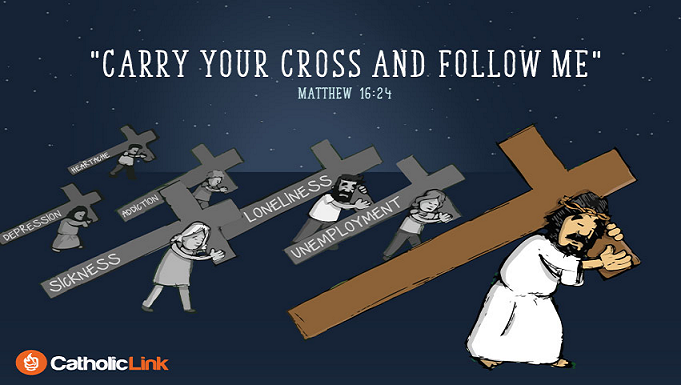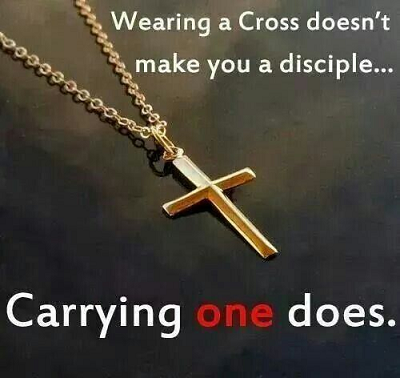23th Sunday in Ordinary Times,
Wis. 9:13-18; Ps. 89:3-5.12-14.17; Philen 1:9-10.12-17; Gosp. of Luke 14: 25-33

Preached by Msgr Philip Heng, SJ at Cathedral of Good Shepherd, Singapore on 8 september 2019
 Jesus in today’s Gospel poses a very big challenge to the crowd and also to you and to me. He proclaimed that we are each to be detached from people and from our possessions. Jesus then added, “Anyone who does not carry his cross and come after me cannot be My disciple.”
Jesus in today’s Gospel poses a very big challenge to the crowd and also to you and to me. He proclaimed that we are each to be detached from people and from our possessions. Jesus then added, “Anyone who does not carry his cross and come after me cannot be My disciple.”
My brothers and sisters in Christ, it is also a big challenge to reflect on the reality of pain and suffering, and the crosses of our lives in the light of our faith because none of us want pain in our lives, and yet such experiences are very much part of the mystery of our relationship with God. And so, in today’s proclamations, Jesus is reminding us to consider very carefully, whether we are willing to live the Gospel as committed as He expects of us as His disciple.
It is understandable that many in the crowd who heard what Jesus proclaimed, left Him. Likewise, many of us here too may be saying to ourselves, “Why is Jesus making such impossible demands? Isn’t it not enough to do good and not harm people, and come to Mass on Sundays and say our prayers? Why must Jesus’ expectations of being His disciple be so demanding?
 My sisters and brothers in Christ, let us begin by reminding ourselves that when Jesus proclaims about the “Cross” to the crowd and His disciples, He is referring to a reality that is beyond pain and suffering. Jesus who is our Lord and Saviour is referring to the Eternal Life and Happiness that He is offering us, as the Good News.
My sisters and brothers in Christ, let us begin by reminding ourselves that when Jesus proclaims about the “Cross” to the crowd and His disciples, He is referring to a reality that is beyond pain and suffering. Jesus who is our Lord and Saviour is referring to the Eternal Life and Happiness that He is offering us, as the Good News.
In other words, when Jesus makes such very radical demands of us, we have to understand that Jesus is placing before us what we need to consider very carefully, and discern very genuinely whether we are willing to live a life that He has shown us, so that we can gain the gift of Eternal Life. And so, the further question is, “Are we trying to find a way of avoiding the “crosses” of our lives and trying to find a way getting to heaven through bypassing the Calvary of Christ?
My brothers and sisters in Christ, such radical challenges of Jesus are understandable if a person is in a state of sin of immoral living, infidelity in marriage, addiction to gambling and the like, and we are called to break free from such sinfulness, so that we do not cause further harm and hurt and destruction in relationships and families.
 If we do not wish to accept the “crosses” of our faith, then we are essentially rejecting the Gospel of Christ, that proclaims that there is no Resurrection without the Passion and Death of Jesus on Calvary. The Cross of Christ and the Resurrection of Christ are inseparable. There are no back doors to bypass at Calvary. It is only through the Crucifixion of Jesus that He gained the Resurrection.
If we do not wish to accept the “crosses” of our faith, then we are essentially rejecting the Gospel of Christ, that proclaims that there is no Resurrection without the Passion and Death of Jesus on Calvary. The Cross of Christ and the Resurrection of Christ are inseparable. There are no back doors to bypass at Calvary. It is only through the Crucifixion of Jesus that He gained the Resurrection.
Put very simply, as we reflect on our daily living, can we attain success in our careers without the needed skills and hard work? Is it realistic to expect to win an Olympics gold medal without thousands of hours of disciplined practice? Can we hope to bring up and build a happy family without making the needed sacrifices of love and witnessing to our children how to love one another and to love God? Are there shot cuts to such dreams and desires of our lives? Without the willingness to pay the price and make the needed sacrifices, we are then clearly not serious and are merely fantasying
My sisters and brothers in Christ, the demands that Jesus makes of us to carry our crosses, if we wish to be His faithful disciples are in fact very reasonable, if we are to consider that the gift that God our Father wishes to give us is not just earthy and materialistic rewards, but the gift of Eternal Life and Happiness.
On the other hand, let us also remember that this invitation of Jesus for you and me to take up is more important and urgent than we think. If we reflect more carefully on what is happening in the secular world, what do we find? Fr James Farfaglia describes the cultural decay of the world as follows. He says, “There is a long list of examples of cultural decay that is obvious to those of us who are willing to look: there is the industrialized slaughter of babies in the womb; the self-sterilization of contraceptives; epidemic promiscuity, pornography and sexual perversion; the avoidance of marriage; rampant divorce and adultery; substance addictions; gender confusion; filth and coarseness in media; the loss of a connection to nature and escape into virtual “reality”; environmental exploitation; rampant materialism; the loss of the dignity of work; racial extremisms; commercialized gluttony; the dysfunctional political and legal system and the like. Indeed, our post-modern society is sick.”
 As this is the desperate reality of the secular world, clearly Jesus’ invitation of you and me to become His disciples to witness to His Gospel of Salvation is very understandable. And for this, we are called to be more fully committed as His disciples by carrying our crosses and following Him with greater fidelity.
As this is the desperate reality of the secular world, clearly Jesus’ invitation of you and me to become His disciples to witness to His Gospel of Salvation is very understandable. And for this, we are called to be more fully committed as His disciples by carrying our crosses and following Him with greater fidelity.
This is because too many of our contemporaries seek an easy life without suffering, without sacrifice, without renunciation, without mortification. Many people would like to stand under the cross of Jesus and cry out “Come down from the cross.” Contemporary society does not want to suffer.
However, my sisters and brothers, in other situations where people who are desperate approach us about their great sufferings, how do we help them make sense of and understand the meaning of the crosses in their lives?
What should a good response be if someone were to come up to me and say, “Father, my son is unemployed; he refuses to work even though he is married with two young children? He demands that I give him money, and when I don’t he becomes violent and wants to beat me up? And as soon as he gets the money, he drinks and gets himself drunk. He has stopped going to church; his wife is depressed and is fearful of his violence? I have even called the police and have obtained a Protection Order . . . but nothing will change. How do we manage such crosses in our lives?
Yet, another person shares, “Father my husband has left me to take care of my children and does not come home. He lives with his mistress, and I am sickly and am not able to work; even when I get some work it is temporary. Other than giving some financial support and advising the person to go to SSO for some help, what should I say? In addition to praying for such a person, it might be of help if we reflect on the crucifixion that Jesus suffered. Jesus and the two thieves were not the only people ever to be crucified by the Roman Empire. Beheading was the capital punishment of choice for Roman citizens, and crucifixion was for non-Roman citizens.
 Consider how horrible crucifixion must have been, if the Romans spared their own citizens such a terrible death?! So painful was death by crucifixion that the Romans eventually did away with it as a form of capital punishment.
Consider how horrible crucifixion must have been, if the Romans spared their own citizens such a terrible death?! So painful was death by crucifixion that the Romans eventually did away with it as a form of capital punishment.
So, when Jesus turned to his disciples and said “If anyone wishes to come after me, he must deny himself and take up his cross daily and follow me” those listening to him knew precisely what crucifixion entailed.
However, Christianity without the cross is not Christianity; only through the cross of Jesus have we gained salvation. So, when we suffer, we should not consider our suffering a burden; rather we must ask God for the grace to bear the cross even as a gift from Him. St Mother Theresa once said: “Suffering is a sign that we have come so close to Jesus on the cross that Jesus can kiss us and that He can show that He is in love with us by giving us an opportunity to share in His passion.”
Undoubtedly there are many forms of suffering and it is our duty to seek practical solutions for our problems, cures for our illnesses and to make this life a better life for ourselves and for everyone. However, let us remind ourselves that the meaning of suffering can only make sense when we contemplate Jesus Christ crucified and risen from the dead.
Finally, as I conclude, it may be good to ask ourselves, “Are there personal “crosses” that I am unwilling to take up? Could this cross be the very difficult challenges of overcoming my vanity, pride, immoral living; infidelity? Or are my crosses the over focus on materialism and my social status at the expense of my love for God and my family? Or even as a sinner with weaknesses, is my cross my lack of will and desires to give sufficient attention to my superficial faith, and not giving God the highest and single-minded priority in my life and the like, where developing a prayer life never seem to be important?”
 “How long have these hindrances been in my life, and how deep is my unwillingness to address them and take up the needed crosses to overcome them? These and others can be very painful daily challenges that are creating much disharmony within my family and my relationship with others, and in particular with God and may faith.
“How long have these hindrances been in my life, and how deep is my unwillingness to address them and take up the needed crosses to overcome them? These and others can be very painful daily challenges that are creating much disharmony within my family and my relationship with others, and in particular with God and may faith.
The path of a faithful disciple that Jesus demands of us is that we are all to identify our crosses and carry them with patience, joy and love. . . for it is through uniting our crosses with Jesus’ Cross that we gain eternal life?
As Thomas a’ Kempis reminds us, If you carry the cross willingly, it will carry and lead you to the desired goal where indeed there shall be no more suffering, /but here there shall be. But, i
f you carry it unwillingly, and if you cast away one cross, you will find another and perhaps a heavier one (The Imitation of Christ, 2:12). And that is also the reason, why Jesus is today’s Gospel proclaims to you and me, “Anyone who does not carry his cross and come after me cannot be My disciple.” To embrace our crosses in life for God’s Greater Glory is to live in God’s Wisdom and gain the Eternal Life and Happiness that awaits us when we die . . .
Adapted from: Visit Fr. James Farfaglia on the web at www.fatherjames.org and listen to the audio podcast of this Sunday homily.
Msgr Philip Heng, S.J.

